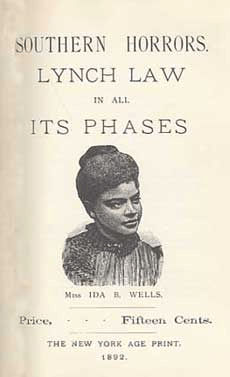
Ida B. Wells, Southern Horrors: Lynch Law in All Its Phases, book cover, 1892.
Now that I’ve actually signed the contract (ohmygodohmygodohmygod), a bit of news from my historian/writer’s life!
I was recently approached by an editor — someone with whom I’ve previously worked on an encyclopedia of women in American history — and invited to join a group of authors writing biographies for an ABC-CLIO series called Women Making History aimed at a high school and undergraduate audience. After some discussion and negotiation I have accepted the invitation; over the next eighteen months I will be working on a biography of journalist and activist Ida B. Well (1862-1931)! I am grateful to Dr. Peg Lamphier and her co-editor Dr. Rosanne Welch, as well as Dr. Kim Kennedy White at ABC-CLIO, for the opportunity to tackle this new type of history writing-for-hire. I have enjoyed shorter projects of this nature and recently declined a much larger reference book project that — while interesting to me! — seemed well beyond my bandwidth to tackle alongside my other commitments. This biography project feels like a good length, with a tight enough focus, to be a challenge … but not an overwhelming one. I look forward to strengthening my research and history writing muscles over the next year and a half.
The book will be — by series design — a synthesis biography, grounded in the research and analysis of specialist historians, rather than a work based on my own archival research. I have a strong background in 19th and 20th century American history, with an emphasis on gender and sexuality, but I am not an expert on African American history or the life of Ida B. Wells. To complete this project, I will rely on the scholarship of the many historians and activists who have ensured Wells’ life and work are not forgotten, and who have placed her story in rich historical, cultural, and political context.
As a white historian approached to write a book about a black intellectual and activist, I took some time to consider under what terms it would be appropriate to accept this job. As with all of my other work-adjacent projects, I confirmed with the series editors that the authors working on this series are not all white — making sure the project met my inclusion rider prerequisite. It does. Now that I have accepted the project, I want to commit publicly to two additional anti-racist actions:
- First, I commit to practicing citational justice, ensuring that the majority of works cited in the book are by scholars of color, and particularly by black women. This also means I will place a priority on purchasing works by black women as I build my research library for the manuscript. If you are interested in the intersection of social justice and citational practice, check out the Cite Black Women Collective, whose five guiding principles inform this commitment. Also this post, “Making Feminist Points” by Sarah Ahmed, and this piece on “The Politics of Citation” by Kecia Ali.
- Second, in the interest of transparency about the financial benefits of this project: I have agreed to an advance of $850.00 and 8% royalties. I will be donating one third of the advance ($285) and 50% of any subsequent royalties (hey, a girl can dream!) to the African American Intellectual History Society (AAIHS) to support the work of scholars whose research and writing make work-for-hire writing projects like this possible.
My goal through these actions is to materially redistribute the financial benefits of the work I will be doing in a way that directly supports scholarship by and about black women. I’m making these commitments public not for cookies but because transparency is an important part of accountability. I also believe it’s important to break the white silence around how we benefit from structural racism, and have matter-of-fact discussions about ways to actively resist white supremacy in our daily lives.
I look forward to digging into the scholarship around Wells’ life, and to creating a new pathway into that scholarship through a biography that will be put in the hands of young people. If all goes well, the book will be out in 2021. In the meantime, if you are interested in learning more about Ida B. Wells, I would encourage you to start where I have begun my own reading: borrow a copy of Paula J. Giddings biography Ida: A Sword Among the Lions (Amistad, 2008) from your nearest library.
